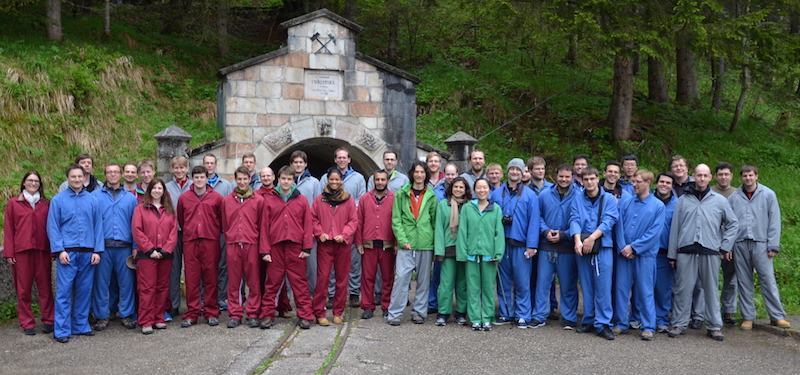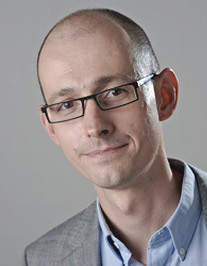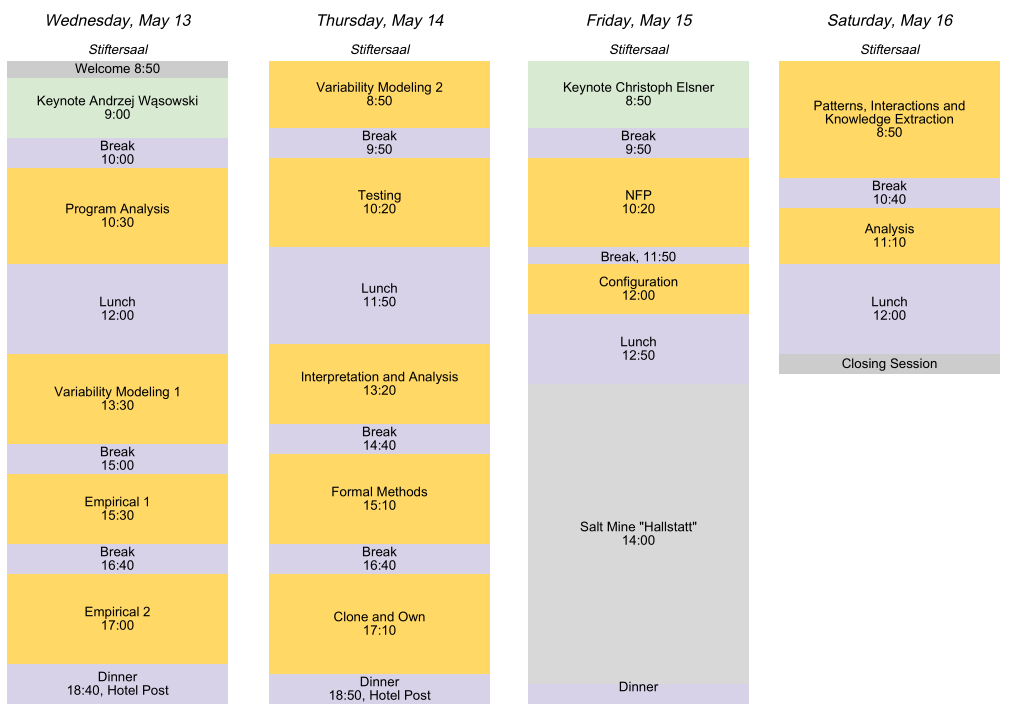FOSD Meeting 2015
International Academy Traunkirchen, Austria
May 13-16, 2015
Concept and Organisation
Group Pictures
Sponsors and Auspices
Important Dates
Venue and Accommodation
Travel and Visa Information
Keynote Talks
Participants and Presentations
Program
Concept and Organisation
The FOSD Meeting is an informal workshop within the field of software development for variability-rich software systems and feature-oriented software development (FOSD). The main goal of the meeting is to foster intensive and interactive discussions around the aforementioned topics. The FOSD meeting provides an open and stimulating atmosphere and encouraged presentations at different levels of maturity.
In particular, the FOSD meeting is a platform for undergraduate (Bachelor, Master) and graduate (PhD) students to present and discuss their ongoing research. There are no paper submissions and no proceedings, but presentations by all participants. Students get valuable feedback on their research, insights in related research topics, and lots of opportunities to initiate collaborations with other researchers. The meeting language is English. The number of participants is limited due to space and time constraints. People interested in participating send an abstract of the planned contribution based on which the participants are selected.
The initial FOSD meeting took place in Passau in 2009. Meetings took also place in Magdeburg (2010), Dresden (2011), Braunschweig (2012), and Dagstuhl (2013, 2014).
The 7th FOSD meeting in 2015 is organized by Florian Angerer (Johannes Kepler University Linz, Austria), Sven Apel (Universität Passau, Germany), Christian Kästner (Carnegie Mellon University, USA), Herbert Prähofer (JKU Linz, Austria) and Paul Grünbacher (JKU Linz, Austria). The meeting will take place at the International Academy Traunkirchen in the Salzkammergut lake region in Upper Austria.
The scientific program of presentations and discussions will be held from May 13 to May 16. Participants are expected to arrive on May 12. We will also organize several social events giving participants the opportunity to enjoy the very nice flaire of the Salzkammergut lake region. There will be a small registration fee for the meeting to cover the costs of the social events. Participants will also have to cover the costs for their travel, accommodation and food.
If you have any questions, please contact Florian Angerer ({This email is obscured. Your must have javascript enabled to see it}).
Group Pictures
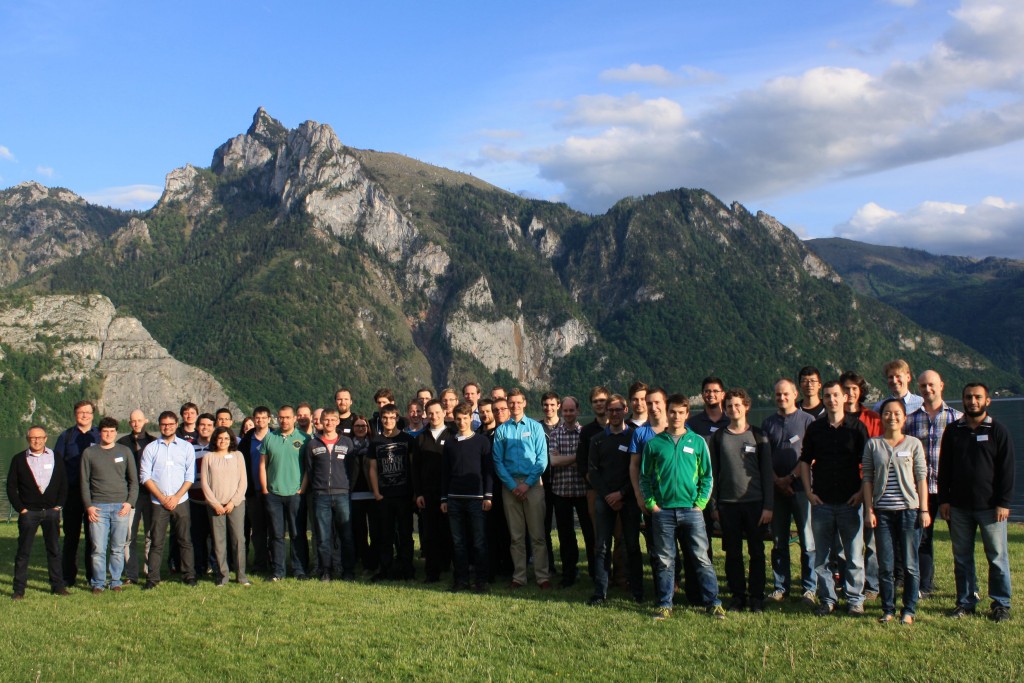
Sponsors and Auspices
FOSD 2015 is organized with support from the Province of Upper Austria and the Christian Doppler Laboratory MEVSS.
The meeting will be held under the auspices of the Governor of Upper Austria, Dr. Josef Pühringer.
Important Dates
| Abstract Submission | February 1st, 2015 (AoE) |
| Acceptance Notification | February 16th, 2015 |
| FOSD Meeting Registration | February 28th, 2015 (AoE) |
| Room Reservation | March 22nd, 2015 (CET) |
| FOSD Meeting | May 13th to May 16th, 2015 |
Venue and Accommodation
The International Academy Traunkirchen is a center for intellectual and creative encounters and is directed by the famous quantum physicist Prof. Anton Zeilinger.

Double rooms and some single rooms are available in Hotel Post or Seehotel Das Traunsee in short walking distance from the meeting venue.
The following special rates are available for FOSD Meeting participants. These daily rates include the room, breakfast, lunch, dinner and coffee breaks:
| Room | Description | Rate |
|---|---|---|
| Single Room | full board (including breakfast, lunch, dinner and coffee breaks) | € 98.30 per person and night |
| Double Room | full board (including breakfast, lunch, dinner and coffee breaks) | € 86.00 per person and night |
Note that only a limited number of rooms is available and bookings have to made by March 22, 2015. The booking form has been sent out to participants by email.
Travel and Visa Information
Getting There
By Train
Take a train from Salzburg, Wels or Vienna to station Attnang/Puchheim and change to a regional train to the direction of Gmunden. Exit at station Traunkirchen Ort. The conference venue is within walking distance.
Check available train connections at the website of the ÖBB (Austrian Federal Railways).
By Plane
The nearest airports are Blue Danube Airport Linz (LNZ), Salzburg Airport (SZG), and Munich Airport (MUC). You can either take a train to Traunkirchen Ort as described above or you can book a transfer with SMS airport transfer taxi. The SMS taxi will pick you up at the airport and bring you directly to the venue. The fare depends on which airport you arrive. You can check out their prices at their website by selecting an airport and looking up destination district Gmunden . The column “einfach” shows the rates for one-way transportation, while the column “hin und retour” shows the rate for a round-trip.
Since the website of the SMS airport transfer taxi seems to be unreachable from the U.S. and maybe other countries, try to send an email. Contact:
Email: sms@flughafentransfer.at
Phone: +43 (0)662 81 61-0
By Car
When coming from Salzburg, take motorway A1 (direction Linz / Vienna) and exit at Regau. When coming from Wels, Linz or Vienna take motorway A1 (direction Salzburg) and also exit at Regau. From Regau, continue towards Gmunden, Altmünster, and finally to Traunkirchen.
Enter your start address to compute your route to the meeting venue:
Visa Information
Depending on your country of residence, you might need a visa to enter Austria (and thereby the whole Schengen zone).
In particular, you will at least need to apply for a travel visa (called “Visa C”).
For more details, please visit the website of the austrian embassy/consulate of your country (e.g. the Austrian Embassy Washington U.S. provides some valuable information). If you need any documents from us (e.g. confirmation of registration), just send an email to us.
Keynote Talks
Andrzej Wasowski — Hunting for Variability Bugs
Andrzej Wasowski is Associate Professor at the IT University of Copenhagen. Previously, he worked also at Aalborg University in Denmark, and as visiting professor at INRIA Rennes and University of Waterloo, Ontario. His interests are in semantic foundations and tool support for model-driven development, especially for software product lines and component-based systems. His projects involve commercial or open-source partners, primarily in the domain of safety-critical embedded systems. W?sowski holds a PhD degree from the IT University of Copenhagen, Denmark (2005) and a MSC Eng degree from the Warsaw University of Technology, Poland (2000). He is a recipient of the Sapere Aude research leadership award from The Danish Council for Independent Research (2012).
Abstract. Highly configurable software systems are among the most complex designs out there. Finding bugs in them is not for those of faint heart. I will begin by describing a couple of real semantic bugs from the Linux kernel, in order to explain the extent of requirements. Then I will sketch two techniques aiming at finding some of these bugs. The Reconfigurator tool attempts to automatically lift highly optimized product-based bug finders to systems with variability. Reconfigurator implements abstractions of variability at the source code level, which allows it to run usual bug finders on the code where variability has been abstracted away or restricted. The abstractions used in Reconfigurator are specified in an abstraction calculus: a small language which can express all possible abstractions on the feature space. The abstraction calculus has a solid formal base in the abstract interpretation theory. The talk presents joint work with Iago Abal, Claus Brabrand, Aleksandar Dimovski, and Jean Melo.
Christoph Elsner — Variability Challenges and Approaches of Industrial Software Development
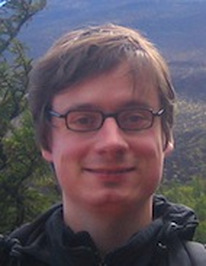 Christoph Elsner is a Certified Software Architect at Siemens Corporate Technology (CT), doing applied research and Siemens-internal consulting projects in the fields of software architecture, ecosystems and product line engineering. He holds a PhD from Friedrich-Alexander University of Erlangen-Nuremberg. Starting from 2008, Christoph has contributed to a variety of innovation and research projects within Siemens. He has authored various peer-reviewed articles and holds the Best Paper Award of the Software Product Line Conference (SPLC) 2010 and a Distinguished Paper Award from the Foundations of Software Engineering Conference (FSE) 2014. He is regular reviewer for conferences and workshops on software product line engineering and software ecosystems.
Christoph Elsner is a Certified Software Architect at Siemens Corporate Technology (CT), doing applied research and Siemens-internal consulting projects in the fields of software architecture, ecosystems and product line engineering. He holds a PhD from Friedrich-Alexander University of Erlangen-Nuremberg. Starting from 2008, Christoph has contributed to a variety of innovation and research projects within Siemens. He has authored various peer-reviewed articles and holds the Best Paper Award of the Software Product Line Conference (SPLC) 2010 and a Distinguished Paper Award from the Foundations of Software Engineering Conference (FSE) 2014. He is regular reviewer for conferences and workshops on software product line engineering and software ecosystems.
Abstract. The variability of large-scale software systems is a crucial challenge for the success of big enterprises such as Siemens. In his talk, Christoph will provide an overview of the most crucial pain points with regard to variability management as perceived in industrial practice, both in early as well as in late phases of the software engineering life cycle. Along with this, he will present different approaches applied within Siemens business units to tackle the challenges. He will give an outlook on the open challenges ahead, in particular, with regard to expressing and analyzing variability of software developed across company boundaries, so called software ecosystems.
Participants and Presentations
| Name(s) and Affiliation | Title of Presentation |
|---|---|
| Alexander Grebhahn (University of Passau, Germany) | Performance Predictions of Configurable Multigrid Methods using Domain Knowledge and Machine Learning |
| Alexander von Rhein (University of Passau, Germany) | Variability-Aware Data-Flow Analysis for Mobile Devices |
| Andreas Ruprecht (FAU Erlangen-Nürnberg, Germany) | Efficient, Yet Robust Extraction of Variability Information from Linux Makefiles |
| Andrzej Wasowski (IT University of Copenhagen, Denmark) | Hunting for Variability Bugs |
| Christian Prehofer (fortiss GmbH, Germany) | Property Preservation for Extension Patterns of State Transition Diagrams |
| Christian Kästner (Carnegie Mellon University, USA) | Variability-Aware Techniques beyond Product Lines |
| Christoph Seidl (TU Dresden, Germany) | Generative Software Product Line Development using Variability-Aware Design Patterns |
| Chu-Pan Wong (Carnegie Mellon University, USA) | Exploring Variation in Java Applications with VarexJ |
| Claus Brabrand (IT University of Copenhagen, Denmark) | Systematic Derivation of Correct Variability-Aware Program Analyses |
| Claus Hunsen (University of Passau, Germany) | A Data Schema for Product-Line-Evolution Research |
| Daniela Lettner (Johannes Kepler University Linz, Austria) | Feature Modeling of Two Large-scale Industrial Software Systems: Experiences and Lessons Learned |
| Florian Angerer (Johannes Kepler University Linz, Austria) | Configuration-Aware Change Impact Analysis |
| Gabriel Ferreira (Carnegie Mellon University, USA) | Characterizing Complexity of Highly-Configurable Systems with Variational Call Graphs |
| Guillaume Bécan (IRISA, France) | Synthesis of Attributed Feature Models: Foundations |
| Hauke Baller (TU Braunschweig, Germany) | Software product line test-suite optimization using genetic algorithms |
| Hendrik Speidel (schnapptack GmbH, Germany) | Domain Specific Document Configurators |
| Jaime Font (Universidad San Jorge, Zaragoza, Spain) | Tailoring Software Product Lines adoption for Model Driven Development Approaches |
| Jean Melo (IT University of Copenhagen, Denmark) | How does the degree of variability affect code comprehensibility? A Controlled Experiment |
| Jens Meinicke (University of Magdeburg, Germany) | VarexJ: A Variability-Aware Interpreter for Java Applications |
| Johannes Bürdek (TU Darmstadt, Germany) | On Reuse in Multi-Goal Test-Suite Generation for Software Product Lines |
| Jürgen Gegenfurtner (Siemens AG, Germany) | Variability Modeling and Analysis of Value Networks in Software Ecosystems |
| Lars Luthmann (TU Braunschweig, Germany) | An I/O Conformance Testing Theory for Software Product Lines based on Modal Interface Automata |
| Leopoldo Teixeira (Universidade Federal de Pernambuco, Recife, Brazil) | A Product Line of Theories for Reasoning about Safe Evolution of Product Lines |
| Lorena Arcega (Universidad San Jorge, Zaragoza, Spain) | Achieving Run-Time Evolution of Dynamic Software Product Lines through a Variability Modeling Approach |
| Lukas Linsbauer (Johannes Kepler University Linz, Austria) | ECCO: Extraction and Composition for Clone-and-Own |
| Malte Lochau (TU Darmstadt, Germany) | Incremental Model-Checking of Delta-Oriented Software Product Lines |
| Márcio Ribeiro (Federal University of Alagoas, Brazil) | An Empirical Study on Fine-Grained Feature Dependencies |
| Markus Weckesser (TU Darmstadt, Germany) | Validation of Cardinality-based Feature Models Using Alloy |
| Norbert Siegmund (University of Passau, Germany) | Generating Realistic Non-Functional Properties |
| Olaf Lessenich (University of Passau, Germany) | Semi-automatic variant merge |
| Reimar Schröter (University of Magdeburg, Germany) | Feature-Model Interfaces for the Modularization of Automated Analyses |
| Sandro Schulze (TU Braunschweig, Germany) | Automated Detection of Variability-Aware Code Smells |
| Sarah Nadi (TU Darmstadt, Germany) | Variability Modeling of Cryptographic Components |
| Sascha Lity (TU Braunschweig, Germany) | Towards Incremental Model Slicing for SPL Regression Testing |
| Sergiy Kolesnikov (University of Passau, Germany) | Performance Prediction in Presence of Feature Interactions. An Empirical Study. |
| Shurui Zhou (Carnegie Mellon University, USA) | Extracting Configuration Knowledge from Build Files with Symbolic Analysis |
| Stefan Hengelein (FAU Erlangen-Nürnberg, Germany) | Analyzing the Internal Consistency of the Linux KConfig Model |
| Stefan Stanciulescu (IT University of Copenhagen, Denmark) | Forked and Integrated Variants In An Open-Source Firmware Project |
| Sven Apel (University of Passau, Germany) | Feature-Based Developer Networks |
| Sven Schuster (TU Braunschweig, Germany) | Variability-Aware Design Patterns |
| Thorsten Berger (University of Waterloo, Canada) and Paul Grünbacher (Johannes Kepler University Linz, Austria) | What is a Feature? A Qualitative Study of Features in Industrial Practice |
| Thomas Thüm (TU Braunschweig, Germany) | VariantSync – Automating the Synchronization of Software Variants |
| Waqar Ahmad (Carnegie Mellon University, USA) | Feature Interaction in Modular Systems |
Program
Day 1 Presenters
| Session | Type | Presenter and Title |
| Program Analysis | L | Alexander von Rhein: “Variability-Aware Data-Flow Analysis for Mobile Devices” |
| L | Sandro Schulze: “Automated Detection of Variability-Aware Code Smells” | |
| L | Gabriel Ferreira: “Characterizing Complexity of Highly-Configurable Systems with Variational Call Graphs” | |
| Variability Modeling 1 | L | Guillaume Bécan: “Synthesis of Attributed Feature Models: Foundations” |
| L | Markus Weckesser: “Validation of Cardinality-based Feature Models Using Alloy” | |
| L | Lorena Arcega: “Achieving Run-Time Evolution of Dynamic Software Product Lines through a Variability Modeling Approach” | |
| Empirical 1 | S | Sven Apel: “Feature-Based Developer Networks” |
| S | Claus Hunsen: “A Data Schema for Product-Line-Evolution Research” | |
| L | Márcio Ribeiro: “An Empirical Study on Fine-Grained Feature Dependencies” | |
| S | Reimar Schröter: “Feature-Model Interfaces for Compositional Analyses” | |
| Empirical 2 | L | Thorsten Berger and Paul Grünbacher: “What is a Feature? A Qualitative Study of Features in Industrial Practice” |
| L | Stefan Stanciulescu: “Forked and Integrated Variants In An Open-Source Firmware Project” | |
| L | Jean Melo: “How does the degree of variability affect code comprehensibility? A Controlled Experiment” |
Day 2 Presenters
| Session | Type | Presenter and Title |
| Variability Modeling 2 | S | Sarah Nadi: “Variability Modeling of Cryptographic Components” |
| S | Daniela Lettner: “Feature Modeling of Two Large-scale Industrial Software Systems: Experiences and Lessons Learned” | |
| S | Jürgen Gegenfurtner: “Variability Modeling and Analysis of Value Networks in Software Ecosystems” | |
| Testing | L | Hauke Baller: “Software product line test-suite optimization using genetic algorithms” |
| L | Johannes Bürdek: “On Reuse in Multi-Goal Test-Suite Generation for Software Product Lines” | |
| L | Sascha Lity: “Towards Incremental Model Slicing for SPL Regression Testing” | |
| Interpretation and Analysis | L | Malte Lochau: “Incremental Model-Checking of Delta-Oriented Software Product Lines” |
| S | Chu-Pan Wong: “Exploring Variation in Java Applications with VarexJ” | |
| L | Jens Meinicke: “VarexJ: A Variability-Aware Interpreter for Java Applications” | |
| Formal Methods | L | Leopoldo Teixeira: “A Product Line of Theories for Reasoning about Safe Evolution of Product Lines” |
| S | Christian Prehofer: “Property Preservation for Extension Patterns of State Transition Diagrams “ | |
| S | Claus Brabrand: “Systematic Derivation of Correct Variability-Aware Program Analyses” | |
| S | Lars Luthmann: “An I/O Conformance Testing Theory for Software Product Lines based on Modal Interface Automata” | |
| Clone and Own | L | Thomas Thüm: “VariantSync – Automating the Synchronization of Software Variants” |
| S | Olaf Lessenich: “Semi-automatic variant merge” | |
| L | Lukas Linsbauer: “ECCO: Extraction and Composition for Clone-and-Own (Extraction)” | |
| S | Stefan Fischer: “ECCO: Extraction and Composition for Clone-and-Own (Composition)” |
Day 3 Presenters
| Session | Type | Presenter and Title |
| NFP | L | Sergiy Kolesnikov: “Understanding the Performance of Highly Configurable Systems “ |
| L | Alexander Grebhahn: “Performance Predictions of Configurable Multigrid Methods using Domain Knowledge and Machine Learning” | |
| L | Norbert Siegmund: “Generating Realistic Non-Functional Properties” | |
| Configuration | S | Hendrik Speidel: “Domain Specific Document Configurators” |
| S | Jaime Font: “Tailoring Software Product Lines adoption for Model Driven Development Approaches” |
Day 4 Presenters
| Session | Type | Presenter and Title |
| Patterns and Knowledge Extraction | S | Waqar Ahmad: “Feature Interaction in Modular Systems” |
| L | Sven Schuster: “Variability-Aware Design Patterns” | |
| S | Christoph Seidl: “Generative Software Product Line Development using Variability-Aware Design Patterns” | |
| S | Shurui Zhou: “Extracting Configuration Knowledge from Build Files with Symbolic Analysis” | |
| S | Andreas Ruprecht: “Efficient, Yet Robust Extraction of Variability Information from Linux Makefiles” | |
| Analysis | L | Stefan Hengelein: “Analyzing the Internal Consistency of the Linux KConfig Model” |
| S | Florian Angerer: “Configuration-Aware Change Impact Analysis” | |
| S | Christian Kästner: “Variability-Aware Techniques beyond Product Lines” |


